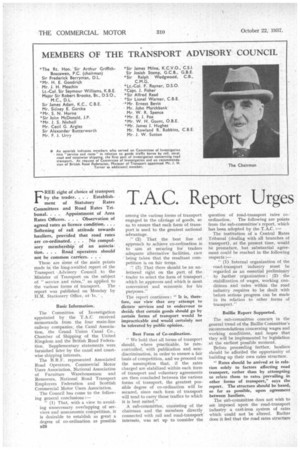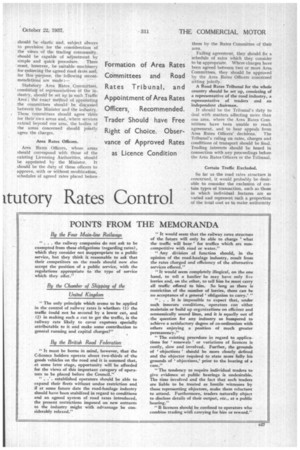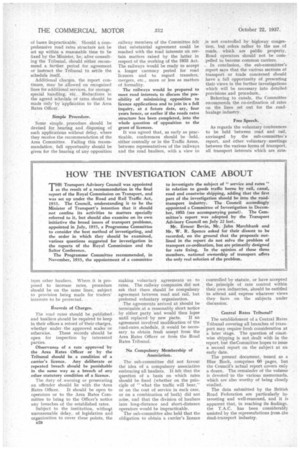T.A.C. Report Urges
Page 60

Page 61

Page 62

If you've noticed an error in this article please click here to report it so we can fix it.
ttutory Rates Control
FREE right of choice of transport by the trader. . . . Establishment of Statutory Rates Committees and Road Rates Tribunal. . . . Appointment of Area Rates Officers. . . . Observation of agreed rates as licence condition. . . . Softening of rail attitude towards hauliers, provided that road rates are co-ordinated. . . . No compulsory membership of an associa• tion. . . . Road . operators should not be common carriers. . . .
These are sbme of the main points made in the long-awaited report of the Transport Advisory Council to the Minister of Transport on the subject of " service and rates," as applied to the various forms of transport. The report was published on Monday by H.M. Stationery Office, at Is. ,
Basic Information.
The Committee of Investigation appointed by the T.A.C.received memoranda from the four main-line railway companies, the Canal Association, the Grand Union Canal Co., Chamber of Shipping of the United Kingdom and the British Road Federation. Supplementary statements were furnished later by the canal and coastwise shipping interests.
The B.R.F. represented Associated Road Operators, Commercial Motor Users Association, National Association of Furniture Warehousemen and Removers, National Road Transport Employers Federation and Scottish Commercial Motor Users Association. . The Council has come to the following general conclusions:— " (1) That, with a view to avoiding unnecessary overlapping of services and uneconomic competition, it is desirable to establish as great a degree of co-ordination as possible B26
among the various forms of transport engaged in the drriage of goods, so as to ensure that each form of transport is used to the greatest national advantage.
" (2) That the best line of approach to achieve co-ordination is to aim at securing for traders adequate alternative facilities, care being taken that the resultant competition is on fair terms.
" (3) That there should be an unfettered right on the part of the ' trader to select the form of transport .which he approves and which is most ' convenient and economic for his purposes."
The report continues It is, there fore, our view that any attempt to dictate services and to endeavour to decide that certain goods should go by certain forms of transport would be impracticable and would certainly not be tolerated by public opinion.
Best Form of Co-ordination.
" We hold that all forms of transport should, where practicable, be ratecontrolled, with publication and nondiscrimination, in order to ensure a fair basis of competition, and we proceed on the assumption that, if the rates charged are stabilized within each form of transport and voluntary agreements are then concluded between the various forms of transport, the greatest possible degree of co-ordination will be secured, since each form of transport will tend to carry those traffics to which it is best suited."
A sub-committee, consisting of the chairman and the members directly connected with rail and road-transport interests, was set up to consider the question of road-transport rates coordination. The following are points from the sub-committee's report, which has been adopted by the T.A.C. :
The institution of a Central Rates Tribunal (dealing with all branches. of transport), at the present time, would be premature, but substantial agreement could be reached in the following respects ;—
" (1) Internal organization of the road-transport industry must be regarded as an essential preliminary to further organization ; (2) the stabilization of wages, working conditions and rates within the road industry requires to be dealt with before serious progress can be made in its relation to other forms of transport."
Bernie Report Supported.
The sub-committee concurs in the general trend of the Baillie Committee's recommendations concerning wages and working conditions, and hopes that they will be implemented by legislation at the earliest possible moment.
Before proceeding further, hauliers should be afforded the opportunity of building up their own rates structure.
" Rates should be arrived at in relation solely to factors affecting road transport, rather than by attempting to relate them to rates prevailing in other forms of transport," says the report. The structure should be based, so far as possible, upon agreement between hauliers.
The sub-committee does not wish to see imposed upon the road-transport industry a cast-iron system of rates which could not be altered. Rather does it feel that the road rates structure should he elastic and, subject always to provision for the consideration of the views Of the trading community. should be capable of adjustment by simple and quick procedure. There must, however, be suitable machinery for enforcing the agreed road fates and, for this purpose, the following recommendationS are made :—
Statutory Area Rates, Committees, consisting of representatives of the industry, should be set up in each Traffic Area ; the exact method of appointing the committees shouldbe. discussed between the Minister and the industry. These committees should agree rates for their own areas and, where services extend beyond one area, the bodies of the areas concerned should jointly agree the charges.
Area Rates Officers.
Area Rates Officers, whose areas should correspond with those of the existing Licensing Authorities, should be appointed by the Minister. It should be the duty of these officers to approve, with or without modification, schedules of agreed rates placed before them by the Rates Committee of their area.
Failing agreement, they should fix a schedule of rates which they consider to be appropriate. Where charges have been agreed between two or more Area Committees, they should be approved by the Area Rates Officers concerned sitting jointly.
A Road Rates Tribunal for the whole country should be set up, consisting of a representative of the road industry, a representative of traders and an independent chairman.
It should be the Tribunal's duty to deal with matters affecting more than One area, where the Area Rates Committees have been unable to reach agreement, and to hear appeals from Area Rates Officers' decisions. The Tribunal's ruling on rates, charges and conditions of transport should be final. Trading interests should be heard in connection with any proceedings before the Area Rates Officers or the Tribunal.
Certain Traffic Excluded.
So far as the road rates structure is concerned, it would probably be desirable to consider the exclusion of certain types of transaction, such as those in which individual features are so varied and represent such a proportion of the total cost as to make uniformity
of bases impracticable. Should a comprehensive road rates structure not be set up within a reasonable time to be fixed by the Minister, he, after consulting the Tribunal, should either recommend a further period for, agreement or instruct the Tribunal to settle the schedule itself.
Additional charges, the report continues, may be .allowed on recognized lines for additional services, for storage, special handling, etc. Reductions In the agreed schedule of rates should be made Only by 'application to the Area Rates Officer.
Simple Procedure.
Some simple procedure should be devised for hearing and disposing of such applications without delay, where they receive the recommendation of the Area Committee. Failing this recommendation, full opportunity should be given for the hearing of any opposition from other hauliers. Where it is proposed to increase rates, procedure should be on the same lines, subject to provision being made for traders' interests to be protected.
Records of Charges.
The road rates should be published and hauliers should be required to keep in their offices a retord of their charges, whether under the approved scales or.
otherwise. These records should be open for inspection by interested parties.
Observance of a rate approved by the Area Rates Officer or by the Tribunal should be a condition of a carrier's licence_ Any deliberate or repeated breach should be punishable in the same way as a breach of any other statutory condition of a licence.
The duty of warning or prosecuting an offender should lie with the 'Area Rates Officer. It should be open to operators or to the Area Rates Committee to bring to the Officer's notice any breaches of the established rates.
Subject to the institution, withmit unreasonable delay, of legislation and organization to cover these points, the B28 railway members of the Committee felt that substantial agreement could be reached with the road interests on certain matters raised by the latter in respect of the working of the 1933 Act. The railways would be ready to accept a longer currency period for road licences and to regard transfers, mergers, etc,, more or less as matters of formality.
The railways would be prepared to meet road interests to discuss the possibility of minimizing opposition to licence applications and to join in a full inquiry, at a future date, say, four years hence, or earlier if the roads rates structure has been completed, into the whole question of opposition to the grant of licences.
It was agreed that, as early as practicable, conferences should be 'held, either centrally or in the Traffic Areas, between representatives of the railways and the road hauliers, with a view to making voluntary agreements as. to rates. The railway companies did not ask that there should be compulsory agreement between road and rail, but preferred voluntary organization. The agreements arrived at should be terminable at a reasonably short notice by either party and would then lapse
until replacedby new Pacts. If an agreement involved modification of the road-rates schedule, it would be necessary to obtain fresh assent from the Area Rates Officer or from the Road Rates Tribunal.
No Compulsory Membership of Association.
The sub-committee did not favour the idea of a compulsory association embracing all hauliers. It felt that the question of a basis on which rates should be fixed (whether on the principle of " what the traffic will bear," or on the cost of service in each case, or on a combination of both) did not arise, and that the division of hauliers into long-distance and short-distance operators would be impracticable.
The sub-committee also held that the obligation to obtain a carrier's licence is not controlled by highway congestion, but refers rather to the use of roads, which are public property. Road operators should not be compelled to become common carriers.
In conclusion, the sub-committee's report says that the various sections of transport or trade concerned should have a full opportunity of presenting their views in the further investigations which will be necessary into detailed.
provisions and procedure..
Referring to canals, the Committee .recommends the co-ordination of rates on the lines set out for the roadhaulage industry.
Free Speech., As regards the voluntary conferences to be held between road and rail, envisaged by the sub-committee's report, and other voluntary, meetings between the various forms of transport, all transport interests which are rate controlled by statute, or have accepted the principle of rate control within their own industries, should be entitled to attend and express whatever views they have on the subjects under discussion.
Central Rates Tribunal?
The establishment of a Central Rates Tribunal covering all branches of transport may require fresh consideration at a later stage. The question of coastwise shipping is not dealt with in the report, but the Committee hopes to issue a second report on the subject at an early date.
The present document, Issued as a Blue Book, comprises GO pages, but the Council's actual report covers only a dozen. The remainder of the volume is devoted to the various memoranda, which are also worthy of being closely studied.
The data submitted by the British Road Federation are particularly interesting and well-reasoned, and it is apparent that, in reaching its findings. the T.A.C. has been considerably assisted by the representations from the rind-transport industry.
























































































































